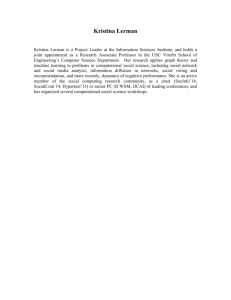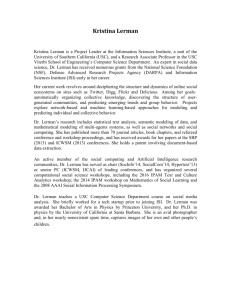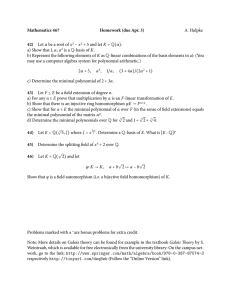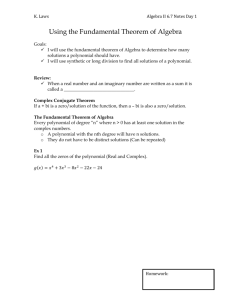Will We Ever Learn? What's Wrong With the Common-Standards Project Abstract
advertisement
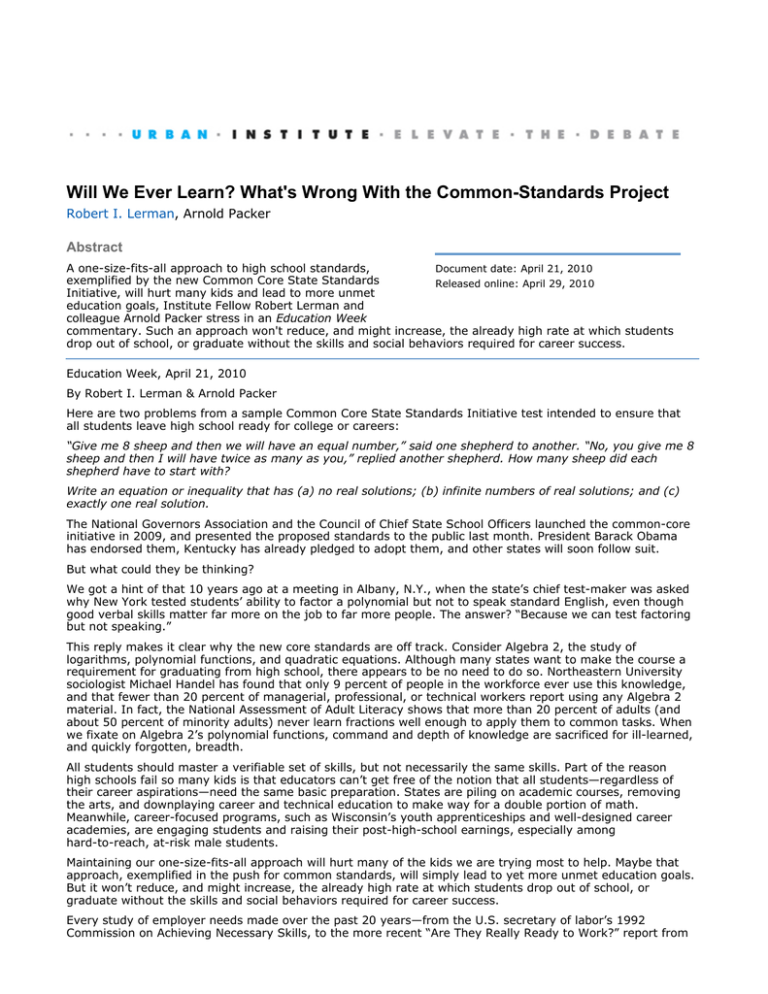
Will We Ever Learn? What's Wrong With the Common-Standards Project Robert I. Lerman, Arnold Packer Abstract A one-size-fits-all approach to high school standards, Document date: April 21, 2010 exemplified by the new Common Core State Standards Released online: April 29, 2010 Initiative, will hurt many kids and lead to more unmet education goals, Institute Fellow Robert Lerman and colleague Arnold Packer stress in an Education Week commentary. Such an approach won't reduce, and might increase, the already high rate at which students drop out of school, or graduate without the skills and social behaviors required for career success. Education Week, April 21, 2010 By Robert I. Lerman & Arnold Packer Here are two problems from a sample Common Core State Standards Initiative test intended to ensure that all students leave high school ready for college or careers: “Give me 8 sheep and then we will have an equal number,” said one shepherd to another. “No, you give me 8 sheep and then I will have twice as many as you,” replied another shepherd. How many sheep did each shepherd have to start with? Write an equation or inequality that has (a) no real solutions; (b) infinite numbers of real solutions; and (c) exactly one real solution. The National Governors Association and the Council of Chief State School Officers launched the common-core initiative in 2009, and presented the proposed standards to the public last month. President Barack Obama has endorsed them, Kentucky has already pledged to adopt them, and other states will soon follow suit. But what could they be thinking? We got a hint of that 10 years ago at a meeting in Albany, N.Y., when the state’s chief test-maker was asked why New York tested students’ ability to factor a polynomial but not to speak standard English, even though good verbal skills matter far more on the job to far more people. The answer? “Because we can test factoring but not speaking.” This reply makes it clear why the new core standards are off track. Consider Algebra 2, the study of logarithms, polynomial functions, and quadratic equations. Although many states want to make the course a requirement for graduating from high school, there appears to be no need to do so. Northeastern University sociologist Michael Handel has found that only 9 percent of people in the workforce ever use this knowledge, and that fewer than 20 percent of managerial, professional, or technical workers report using any Algebra 2 material. In fact, the National Assessment of Adult Literacy shows that more than 20 percent of adults (and about 50 percent of minority adults) never learn fractions well enough to apply them to common tasks. When we fixate on Algebra 2’s polynomial functions, command and depth of knowledge are sacrificed for ill-learned, and quickly forgotten, breadth. All students should master a verifiable set of skills, but not necessarily the same skills. Part of the reason high schools fail so many kids is that educators can’t get free of the notion that all students—regardless of their career aspirations—need the same basic preparation. States are piling on academic courses, removing the arts, and downplaying career and technical education to make way for a double portion of math. Meanwhile, career-focused programs, such as Wisconsin’s youth apprenticeships and well-designed career academies, are engaging students and raising their post-high-school earnings, especially among hard-to-reach, at-risk male students. Maintaining our one-size-fits-all approach will hurt many of the kids we are trying most to help. Maybe that approach, exemplified in the push for common standards, will simply lead to yet more unmet education goals. But it won’t reduce, and might increase, the already high rate at which students drop out of school, or graduate without the skills and social behaviors required for career success. Every study of employer needs made over the past 20 years—from the U.S. secretary of labor’s 1992 Commission on Achieving Necessary Skills, to the more recent “Are They Really Ready to Work?” report from the Conference Board and the nonprofit Corporate Voices for Working Families—has come up with the same answers. Successful workers communicate effectively, orally and in writing, and have social and behavioral skills that make them responsible and good at teamwork. They are creative and techno-savvy, have a good command of fractions and basic statistics, and can apply relatively simple math to real-world problems such as those concerning financial or health literacy. Employers never mention polynomial factoring or solving shepherd problems. All the recent work in cognitive science and adult success, summed up in books such as Drive, by Daniel Pink, and The Global Achievement Gap, by Tony Wagner, stresses the importance of having pride and interest in what you do. Yet most schools ignore career-oriented approaches, especially those that combine learning on the job with classroom instruction. Time-consuming but interesting and relevant project-based learning takes a back seat to robotic drill-for-the-test instruction, until school becomes so boring that students want to drop out—and do. Education reformers have to move beyond platitudes. Requiring every child to take courses oriented toward a rigorous college education (as the common core does) when current high school dropout rates are sky-high will produce results similar to the unmet education goals set by Congress in the 1990s for the year 2000. We’ve not come close to a 90 percent high-school-graduation rate or to eliminating the graduation gap between minority and nonminority students. We need rigorous but basic academics, homing in on skills that will be used, and not short-shrifting the “soft skill” behaviors that lead to success in college and careers. The management guru Peter Drucker got it right: “The result of a school is a student who has learned something and puts it to work 10 years later.” Robert I. Lerman is an institute fellow at the Urban Institute and a professor of economics at American University in Washington. Arnold Packer served as an assistant U.S. secretary of labor from 1977 to 1980, and as the executive director of the secretary of labor's Commission on Achieving Necessary Skills, known as SCANS. Other Publications by the Authors Robert I. Lerman Arnold Packer Usage and reprints: Most publications may be downloaded free of charge from the web site and may be used and copies made for research, academic, policy or other non-commercial purposes. Proper attribution is required. Posting UI research papers on other websites is permitted subject to prior approval from the Urban Institute—contact publicaffairs@urban.org. If you are unable to access or print the PDF document please contact us or call the Publications Office at (202) 261-5687. Disclaimer: The nonpartisan Urban Institute publishes studies, reports, and books on timely topics worthy of public consideration. The views expressed are those of the authors and should not be attributed to the Urban Institute, its trustees, or its funders. Copyright of the written materials contained within the Urban Institute website is owned or controlled by the Urban Institute. Source: The Urban Institute, © 2012 | http://www.urban.org
